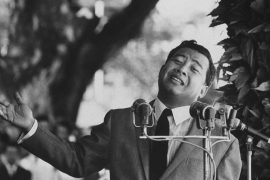On February 20th, 2015, a Royal Decree, signed by Cambodian King Norodom Sihamoni, officially appoints Van Sam Oeun, a former CNRP lawmaker, who recently defected to the ruling CPP on the ground of “not having an opportunity to serve the nation in accordance with his will and experiences”, a personal advisor to Prime Minister Hun Sen, adding him to one of the more-than-a-hundred advisors the Prime Minister already has. Despite repeated denial from both the Prime Minister and Mr. Sam Oeun himself, the defection is widely perceived as a political trade, in which a shift of partisanship is rewarded with political power. To many Cambodians, such provision of position to a newly-defected member into the ruling CPP is not at all a surprise. The motive of this defection is to a large degree an open secret- a patronage deal. The defection of Mr. Van Sam Oeun is merely one of the series of party switching, particularly to the CPP, which has long characterized Cambodia’s party politics. Although party switching is an all too common phenomenon in Cambodian politics, very scant attention has been paid to how it portrays Cambodia’s party system. Two observations can be made from this pattern.
First, frequent party switching in Cambodia signifies the absence of programmatic/ideological commitment of political parties – an important feature of party identity which effectively binds party politicians, activists and members into its coalition. In a party system in which political parties lack clear political programs or ideologies, and particularly where selective incentives are commonly rewarded to defectors, politicians are motivated to shop for the best offer because partisanship is inspired by personal benefits, not by any sense of collective belonging to the party. In Cambodia’s party system, programmatic/ideological labels of political parties have been largely absent. Parties, therefore, have become electoral vehicles for ambitious politicians to gain access to public office, and with that, to state resources.
The Cambodian People’s Party (CPP), in spite of its longstanding existence, has yet to be able to establish clear political programs/ideologies to distinguish itself from other political parties. Its primary source of membership mobilization, excluding its waning past legacy of “national liberation”, has been clientelistic appeals, including, among others, outright gifts, vote-buying, patronage jobs and state contracts/licences. Very few, if any, CPP members, activists, and politicians tend to associate themselves with the party based off its political programs. The absence of political programs/ideologies also applies to other political parties. Funcinpec Party, whose initial popular support and electoral victory in 1993 sprang primarily from the heroic symbol of the late King Norodom Sihanouk, has not been able to present itself as a coherent party with distinguishable party ideologies, except its claim to protect Cambodia’s monarchy. Given the declining roles and influence of the King in contemporary Cambodian politics, Funcinpec’s party platform is no longer appealing to its members and voters. Funcinpec’s political reification in the public imagination further declines following its joining in the coalition government with the CPP in 2003. As an invisible junior partner in the coalition, Funcinpec cannot distinguish its party programs from those of the CPP. And neither can Funcinpec supporters. The newly-merged Cambodia National Rescue Party (CNRP), despite its increasing credibility as a real threat to the incumbent CPP, has also yet to be able to institute its own distinct programmatic policies. Its “seven-point” party programs are still largely populist and to a large extent are vulnerable to external economic shocks. To do the CNRP a fair justice, however, it is too early to judge the party, given its sheer newness in the electoral system. The absence of party programs among political parties in Cambodia is evidently shown in Asia Foundation’s survey released in December 2014, which shows that two third of the respondents were not aware of major policy differences among parties.
Second, the fact that newly defected politicians are generally rewarded with (lucrative) political positions indicates that the CPP’s party structure is weakly-organized and that personalism triumphs party organization. In a well-organized party structure, accepting new defectors is generally fiercely confronted by party members, who anticipated increased competition for chances of promotion. An addition of a lateral member into the party structure would undoubtedly contribute to the crowd of people queuing in the waiting list. within the CPP, new defectors are almost instantly lifted up the ladder, bypassing the existing members, especially the party rank-and-file. An obvious case in point is Mr. Sam Oeun’s immediate appointment as PM Hun Sen’s personal advisor, a position supposedly granted regardless of Mr. Sam Oeun’s personal service, seniority or degree of loyalty to the party. A noticeable wave of defection from Funcinpec to the CPP in 2009, following the latter’s landslide victory in the 2008 elections, also took a similar trait. A significant number of defectors obtained government positions across ministries. Such “shortcut” promotion of new defectors therefore suggests that the internal life of the CPP is not steered by the party, but rather by its leader, thereby substantially weakening internal-party democracy.
The aforementioned description explicitly illustrates that the frequent party switching in Cambodia is the direct result of clientelism and inchoate party system. Political parties have not been able to institutionalize their distinct party programs and organization to sustain party loyalty from their members, activists and supporters. Clientelistic appeals have instead mainly been used as resources for electoral mobilization, particularly for the ruling CPP. Other than party switching, high electoral volatility, party schism, party merger, and low barrier of political entry into the electoral arena are among some other outstanding characteristics signifying the fluidity of Cambodia’s party system.





You’ve put it nicely. I’m enjoy reading it. I’m not so bought in that CPP or other parties have no “programmatic/ideological commitment” though. Probably, you may define what ideological commitment you referring to? Sadly, I don’t have any in depth info ab the parties to share. I’m still doubtful what if there is a good ideology but politicians still switch in search for better interests n positions? Isn’t it the nature of politics? How can we be confident that CPP has none? Would be more insightful if you can share CPP strategic guidebook or the like. To the second point, I don’t think counselling position does any trouble in power competition within CPP. I personally think it is one of the least impactful n demanding position in that regard. He cant execute anything only recommending. If it were Minister post like the case of Sun Chanthol or Kanthaphavi, it would be matter. Thus it’s a bit early to conclude that CPP’s structure is weak based on that assumption.
I like ur new analytical approach. Looking forward to ur other analysis. Well done, dude!
Thanks for your questions, Meas Sak. These are good questions, and some of them are worth a whole length of a research paper. But let me try to explain it in a shortest possible fashion. I am not an expert in it, though. This is my new research interest.
A political party is considered programmatic when it generates policies and mobilizes voters based on consistent policies, also known as “salient issues”, representing its stance on a particular issue area. For example, in the US, the Republican Party’s political programs/ideology is conservatism, supporting free trade, while the Democratic Party’s is embedded liberalism. The British Labor Party represents labor unions and takes a socialist platform. When a party is programmatic, its party label attaches with it distinguishable party policies because their stance is consistent over time. Now these parties are all in established democracies. The reason why programmatic parties are hard to emerge in new democracies is a long complicated story, but one of the most telling reasons is the fact that they were born out of institutional origin. Following the introduction of democracy into their country, parties in these polities focused mainly on crafting institutional framework and constitution to run a post-communist/post-conflict country. Mobilizing voters and developing party programs based on salient issues therefore was mainly of secondary importance. Some parties joined elections very shortly after their creation, while some, as in the case of post-conflict societies like Cambodia, were created even after the first or second election. They simply wanted to win elections to control government. Because voters in new democracies are mainly poor, parties, especially the incumbents, have all the reasons to mobilize voters using clientelistic appeals. When it’s so cheap to buy votes, why should parties develop programmatic policies when the rest doesn’t? This is a collective action problem. There is a term to describe political parties in new democracies, and that’s the so-called “catch-all” parties. While parties in old democracies catch certain segments of the society, parties in new democracies catch all. They catch as many as they can using private excludable benefits.
Politicians in programmatic parties rarely switch parties because they are embedded into the party’s collective identity, which is clearly distinguishable from that of other parties. This makes their membership in a certain party unique. Generally politicians in programmatic parties receive fairly good incentives to stay in their own party because a defection to a different party would put them at the bottom level of party rank. As I said, members of a well-organized party structure strongly resist acceptance of defected members because that would increase the competition for party rank. It is worth noting also, however, that a country’s electoral system- be it an open-list or closed-list proportional representation, a presidential or a parliamentary system- also determines how party members get access to public office. This is actually what I am trying to do research more about.
You are right that a personal advisor is not as influential as, say, a ministerial post. What I am trying to portray here is the fact that clientelistic appeal is used to attract defectors in Cambodia’s party system and that the CPP’s internal party democracy is subordinated to the discretionary power of its leader . I raise the case of Mr. Sam Oeun here because it’s the newest case of party switching.
The CPP’s party platform is documented in a 37-page google-doc file. It mostly talks about its achievement in national liberation from the KR regime, and some typical well-worded political rhetoric. I doubt if its party members actually have read that.
https://docs.google.com/gview?url=http%3A%2F%2Fwww.cpp.org.kh%2Ffiles%2F2013%2F06%2F42%2FPolitical+Platform+2013-2018+Khmer.pdf
I hope I have answered your questions 🙂